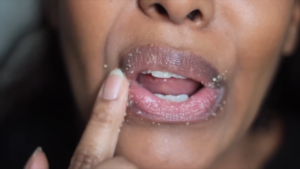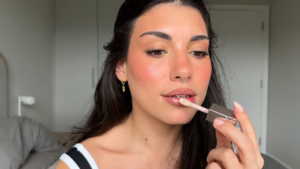Beyond Acne: Understanding the Complexities of Acne Caused by Excess Oil, Clogged Pores, Bacteria, and Hormones. Acne is a common skin condition that affects people of all ages. Although often thought of as a teenage problem, acne can continue into adulthood and even affect older adults. Understanding the complex causes of acne is critical to developing effective treatment strategies.
Factors Causing Acne
Acne is caused by a combination of factors, including:
- Excess oil (sebum) production: The sebaceous glands in the skin produce sebum, which helps keep the skin hydrated. However, excessive sebum production can clog pores.
- Clogged pores: When pores become clogged with sebum, dead skin cells, and dirt, blackheads (white or black spots) can form.
- Bacteria: A bacteria called Propionibacterium acnes (P. acnes) lives on the skin and is usually harmless. However, when pores are blocked, these bacteria can multiply and cause inflammation.
- Hormones: Hormones, especially androgens, can stimulate sebum production and make acne worse. Hormonal fluctuations during puberty, menstruation, and pregnancy can trigger acne.
Types of Acne
Acne can be classified into several types, depending on the severity:
- Non-inflammatory acne: Includes whiteheads (closed blocked pores) and blackheads (open blocked pores).
- Inflammatory acne: Includes papules (small red bumps), pustules (pus-filled red bumps), nodules (large, painful bumps), and cysts (pus-filled pockets under the skin).
Acne Risk Factors
In addition to the main causal factors, several risk factors can increase the chance of developing acne, including:
- Family history: People with a family history of acne are more likely to experience it.
- Skin type: People with oily skin are more prone to acne.
- Certain medications: Some medications, such as steroids and lithium, can trigger acne.
- Diet: Certain foods, such as foods high in sugar and dairy, can worsen acne in some people.
- Stress: Stress can trigger the production of hormones that can make acne worse.
Acne Treatment
Acne treatment depends on the type and severity. Some common treatment options include:
- Topical treatments: Creams, gels, and lotions containing ingredients such as benzoyl peroxide, salicylic acid, or retinoids can help kill bacteria, reduce inflammation, and unclog pores.
- Oral medications: Antibiotics, such as tetracycline or erythromycin, may be prescribed to kill the bacteria that cause acne. Isotretinoin, a powerful oral retinoid, may be used for severe cases of acne.
- Hormonal therapy: Birth control pills and anti-androgen medications can help regulate hormone levels and reduce sebum production.
- Laser and light treatments: These treatments can help kill bacteria, reduce inflammation, and increase collagen production.
Acne Prevention
Although it cannot always be prevented, several steps can help reduce the risk of acne, including:
- Wash your face regularly: Wash your face twice a day with a gentle cleanser to remove excess oil and dirt.
- Use oil-free products: Avoid skin care products and cosmetics that contain oil, as they can clog pores.
- Avoid touching your face: Touching your face can transfer bacteria to your skin and cause acne.
- Manage stress: Stress can trigger acne, so find healthy ways to manage stress.
- Pay attention to diet: Although there is no strong scientific evidence, some people find that avoiding certain foods, such as foods high in sugar and dairy, can help reduce acne.
Conclusion
Acne is a complex skin condition caused by a combination of factors, including excess oil production, clogged pores, bacteria, and hormones. Understanding the causes and risk factors for acne is critical to developing effective treatment strategies. With proper treatment, most cases of acne can be controlled and managed. If you are struggling with acne, it is important to consult a dermatologist to determine the best treatment for your type and severity of acne








